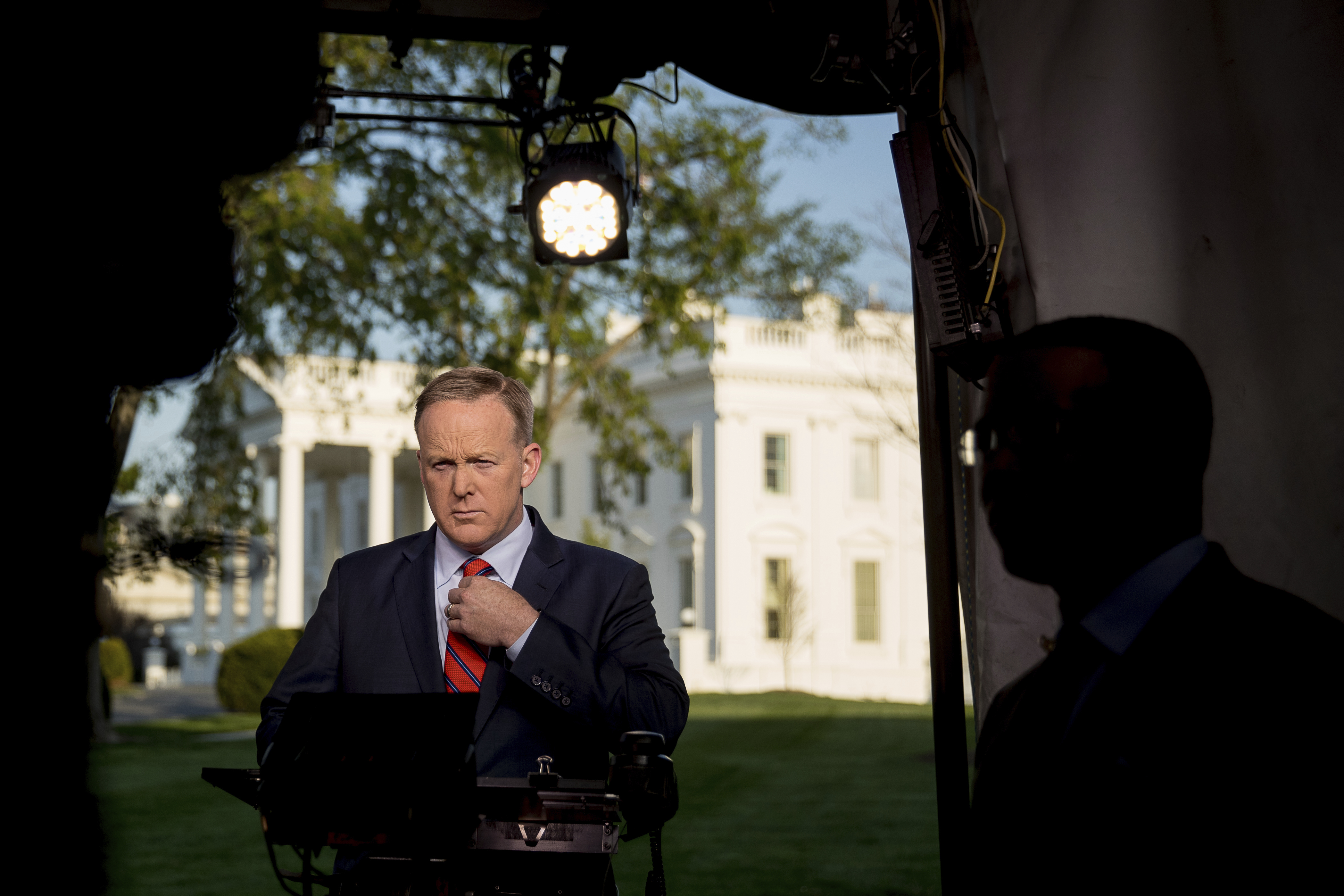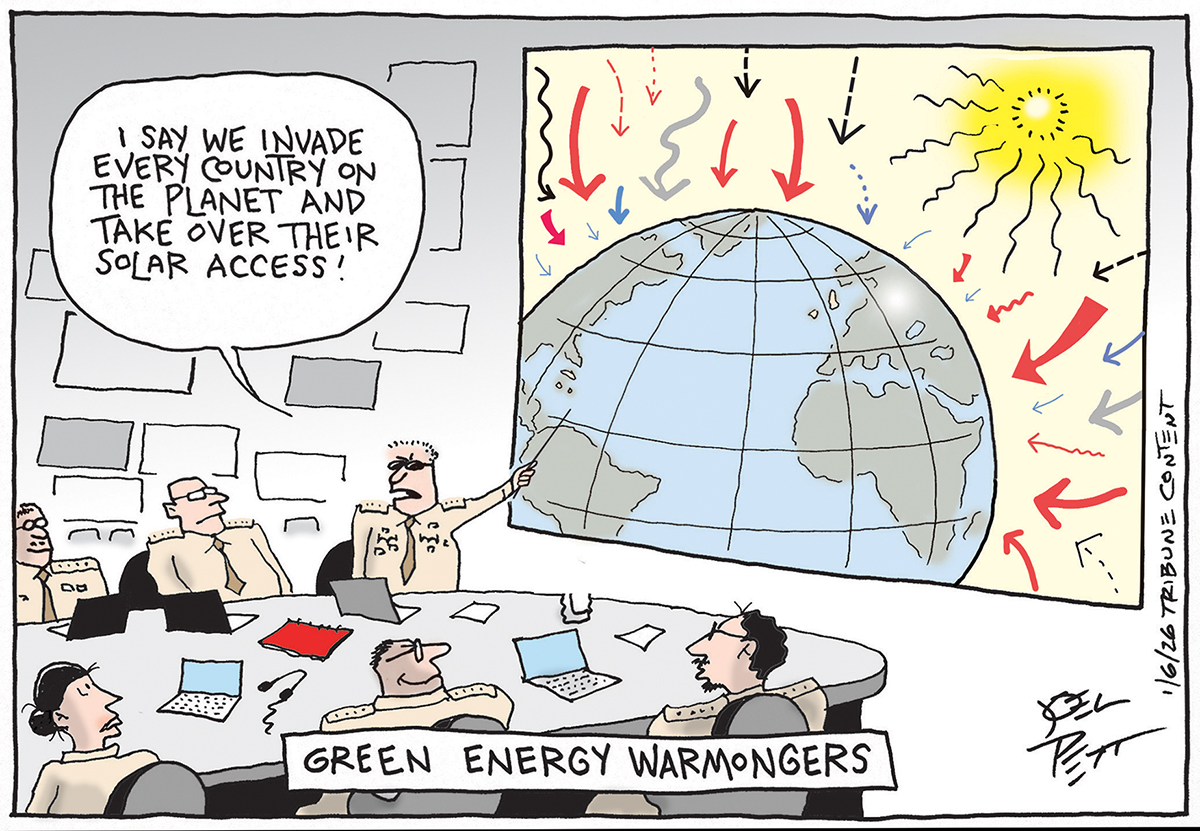What Sean Spicer's Hitler gaffe reveals
The White House press secretary found himself making ludicrous claims about the Holocaust because he was forced to defend a ludicrous policy


Sean Spicer is no historian, that's for sure.
And for a man whose job it is to talk in front of cameras, Spicer is spectacularly inarticulate. That said, it was almost hard not to feel sorry for him on Tuesday as he frantically scampered through a bunch of half-sentences and aborted ideas about Syrian President Bashar al-Assad and Adolf Hitler, chemical weapons and the Holocaust, in a desperate search for an exit out of the rhetorical chamber of horrors he had locked himself into.
But I'm not here to make fun of him. (Okay, maybe just a little.) I want to argue that there are reasons why Spicer found himself saying ludicrous things about World War II, having to do with the Trump administration's morally and logically bankrupt policy in Syria, and likely in the rest of the world.
The Week
Escape your echo chamber. Get the facts behind the news, plus analysis from multiple perspectives.

Sign up for The Week's Free Newsletters
From our morning news briefing to a weekly Good News Newsletter, get the best of The Week delivered directly to your inbox.
From our morning news briefing to a weekly Good News Newsletter, get the best of The Week delivered directly to your inbox.
When Spicer began sharing his thoughts on World War II, he was trying to explain why it was that President Trump decided to lob a few dozen missiles at a Syrian air base after Assad's government launched a chemical weapons attack on the town of Khan Sheikhoun, the first such attack since Trump took office. It required explanation, since Trump had spent years as a private citizen telling President Obama not to intervene militarily in Syria, even after a much worse chemical attack in 2013. And there's the matter of the half million or so civilians Assad has already killed with conventional weapons, which also did not lead Trump to consider military action.
So to justify Trump's decision, Spicer had little choice but to argue that what happened in Khan Sheikhoun was qualitatively worse than anything that had come before. That justification can be found in the taboo against the use of chemical weapons, one that is widely shared but almost never seriously interrogated. Without going into too much detail on the question, it's difficult to argue that having your family gassed to death would be worse than having them blown apart by a bomb.
But when Trump made his decision, it was then left to his aides and allies, none more than Spicer, to explain why it was that these particular victims of Assad's boundless brutality demanded American military action. If you have to argue that a chemical weapons attack on a single town is by far the worst thing that has happened in a bloody civil war that has lasted for six years, and you're desperately trying to make the case to skeptical reporters, you might find yourself reaching for something like, "You had someone as despicable as Hitler who didn't even sink to using chemical weapons."
The likely thought that was spinning around Sean Spicer's addled mind at that moment was probably that the Germans didn't use chemical weapons on the battlefield (to which one would have to reply, so what?). But facing a room full of dropped jaws and frantically tweeting fingers, Spicer tried to explain, and just made things worse:
A free daily email with the biggest news stories of the day – and the best features from TheWeek.com
I think when you come to sarin gas, there was no — he was not using the gas on his own people the same way that Assad is doing, I mean, there was clearly [...] There was not — he brought them into the Holocaust center, I understand that. But I'm saying in the way that Assad used them, where he went into towns, dropped them down to innocent — into the middle of towns. It was brought — so the use of it — I appreciate the clarification there. That was not the intent.
The clear implication, at least in that moment, was that as bad as it may have been to kill millions in death camps (or "the Holocaust center"), dropping chemical weapons on a town is even worse. With time to reflect and choose his words more carefully, Spicer surely wouldn't say such a thing. And afterward he apologized, not only to the public but also in a phone call to billionaire casino magnate Sheldon Adelson, apparently on the theory that when you offend the Jews, making amends requires a personal apology to the richest Jew Donald Trump knows.
But right then it was what he found himself saying, because he was charged with arguing that the attack on Khan Sheikhoun was so horrific that it outweighed everything else that Assad has done. And his statement was peppered with other words and phrases meant to convey the unique horror of this event: that the victims were "innocent" (unlike other Syrian victims, not to mention those in the Holocaust?), and that Assad had killed "his own people" (as though German Jews were not German, not to mention the implication that it wouldn't have been as bad had it been someone else's people he was slaughtering).
Even in ordinary circumstances, Sean Spicer's job is exceedingly difficult, because he has to defend Donald Trump. This task requires him to do things like go before the cameras and insist that Trump's inauguration was the best attended in history, when both he and everyone listening to him knows he's lying. But it gets even harder when he has to defend incoherent policies like the one the administration is executing in Syria.
And it is incoherent, because it seems to be based mostly on Trump's whims, like his desire to seem tougher than Barack Obama. Which of course you can't say out loud, so you have to offer a humanitarian justification for what was ultimately a weak and ineffectual military strike, given the fact that the Syrian government not only resumed flights out of the airfield we bombed within a day or so, but even resumed bombing Khan Sheikhoun itself.
The administration's foreign policy doctrine used to be "America First," meaning we would do whatever was in our own narrow interests, with little or no regard to alliances or humanitarian concerns. Now its position seems to be that America will intervene militarily in a civil war if and only if somebody uses chemical weapons, because those weapons are more awful than any other kind of weapon, provided the president is sufficiently moved by photos of dead babies.
Would you want to go in front of reporters and try to defend that? If you had to, you might not be dumb enough to make Hitler comparisons. But you'd have a pretty hard time.
Paul Waldman is a senior writer with The American Prospect magazine and a blogger for The Washington Post. His writing has appeared in dozens of newspapers, magazines, and web sites, and he is the author or co-author of four books on media and politics.
-
 Political cartoons for January 11
Political cartoons for January 11Cartoons Sunday’s political cartoons include green energy, a simple plan, and more
-
 The launch of the world’s first weight-loss pill
The launch of the world’s first weight-loss pillSpeed Read Novo Nordisk and Eli Lilly have been racing to release the first GLP-1 pill
-
 Maduro’s capture: two hours that shook the world
Maduro’s capture: two hours that shook the worldTalking Point Evoking memories of the US assault on Panama in 1989, the manoeuvre is being described as the fastest regime change in history
-
 The billionaires’ wealth tax: a catastrophe for California?
The billionaires’ wealth tax: a catastrophe for California?Talking Point Peter Thiel and Larry Page preparing to change state residency
-
 Bari Weiss’ ‘60 Minutes’ scandal is about more than one report
Bari Weiss’ ‘60 Minutes’ scandal is about more than one reportIN THE SPOTLIGHT By blocking an approved segment on a controversial prison holding US deportees in El Salvador, the editor-in-chief of CBS News has become the main story
-
 Has Zohran Mamdani shown the Democrats how to win again?
Has Zohran Mamdani shown the Democrats how to win again?Today’s Big Question New York City mayoral election touted as victory for left-wing populists but moderate centrist wins elsewhere present more complex path for Democratic Party
-
 Millions turn out for anti-Trump ‘No Kings’ rallies
Millions turn out for anti-Trump ‘No Kings’ ralliesSpeed Read An estimated 7 million people participated, 2 million more than at the first ‘No Kings’ protest in June
-
 Ghislaine Maxwell: angling for a Trump pardon
Ghislaine Maxwell: angling for a Trump pardonTalking Point Convicted sex trafficker's testimony could shed new light on president's links to Jeffrey Epstein
-
 The last words and final moments of 40 presidents
The last words and final moments of 40 presidentsThe Explainer Some are eloquent quotes worthy of the holders of the highest office in the nation, and others... aren't
-
 The JFK files: the truth at last?
The JFK files: the truth at last?In The Spotlight More than 64,000 previously classified documents relating the 1963 assassination of John F. Kennedy have been released by the Trump administration
-
 'Seriously, not literally': how should the world take Donald Trump?
'Seriously, not literally': how should the world take Donald Trump?Today's big question White House rhetoric and reality look likely to become increasingly blurred
